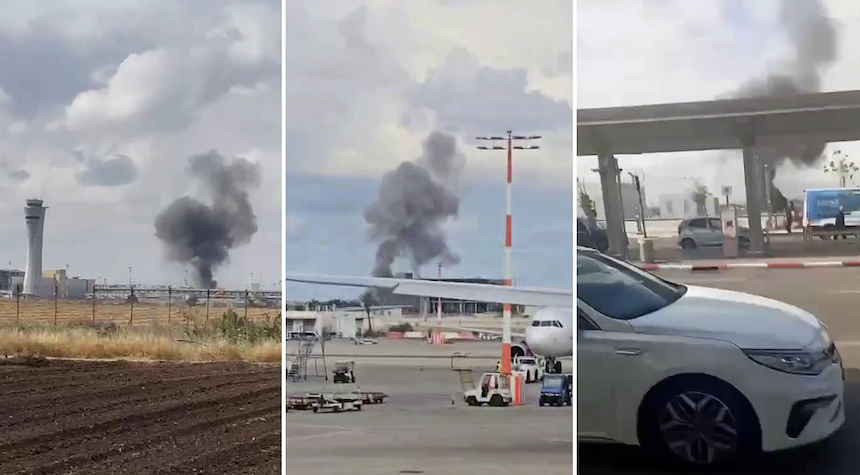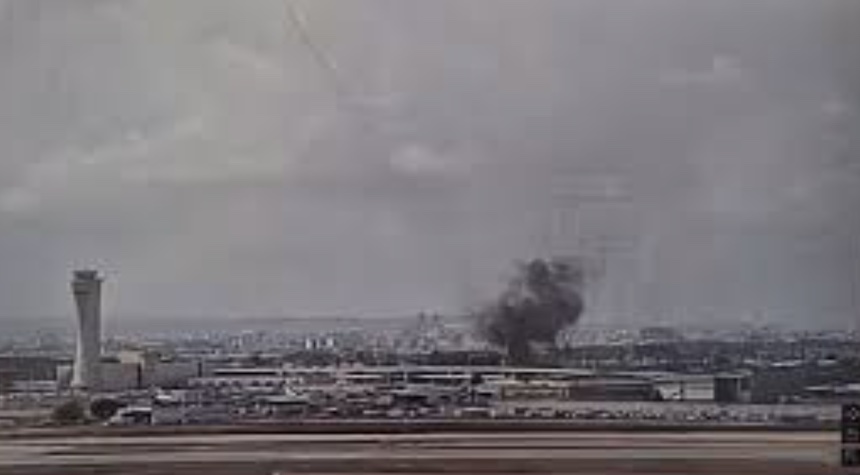A missile fired by Iranian-backed rebels in Yemen briefly disrupted flights and commuter traffic at Israel’s main international airport on Sunday, after striking open ground within the airport perimeter, sending up a plume of smoke and sparking panic among travelers.
In solidarity, the Houthis attacked Israel throughout the Gaza War. This attack occurred just hours before Israeli cabinet members were to vote on intensifying the military operations in Gaza. Israel’s chief of staff, Lieutenant General Eyal Zimir, announced that the army would be calling up tens of thousands of reserves.
Israel’s military confirmed this was the first time a missile had struck the airport grounds since the war began. The area was hit by fragments of missiles and interceptors. Israel’s military said that multiple attempts to intercept it were unsuccessful.
Israel Airports Authority said traffic was resumed in an hour. Israel’s Magen David Adol Paramedic Service said four people suffered minor injuries.
Many international airlines have cancelled or delayed flights. Due to the wars between Hamas, Hezbollah and Israel, a number have suspended flights to Israel. Recently many airlines resumed flights to Israel.
Houthi military spokesman Brig. Gen. Yahya Saree said in a video statement that the group fired a hypersonic ballistic missile at the airport.
Since the Gaza War began on October 7, 2023 most of the missiles fired by the Houthi rebels have been intercepted. Some missiles penetrated Israel’s antimissile system and caused significant damage.

In March, the U.S.A. launched an offensive on the Yemeni rebels, Israel’s principal ally.
Benjamin Netanyahu, Prime Minister of Israel said the U.S. supported Israeli military operations against the Houthis. “It’s not bang, bang and we’re done, but there will be bangs,” he said in a video posted on social media.
In a later statement, Netanyahu stated that Israel would “Respond at the time, place, and manner we choose to their Iranian terror masters.”
A senior Israeli official, who spoke under condition of anonymity said that, according to the regulations, on Sunday night, the Security Cabinet would meet to vote on plans to expand the war in Gaza.
Zamir said, “We will expand operations and destroy all infrastructure above and below the ground.”
Itamar Ben-Gvir, of Israel’s National Security Ministry on the far right, in an interview with Israeli Army Radio, demanded Israel to bombard “the food, electric supplies and other necessities” in Gaza.
The fighting stopped after an 8-week ceasefire with Hamas. More aid was allowed into Gaza and some Israeli hostages were released. In March, Israel resumed its attacks, and the ceasefire was broken.

Israel stopped goods from entering Gaza in March in an effort to pressure Hamas to negotiate on Israel’s terms for a new ceasefire. The result has been the worst humanitarian crisis in Gaza since the start of the conflict.
Robert Abela stated that his country of Malta had offered an expert marine surveyor in order to investigate the damage caused to a ship that was said to be carrying aid and that had been organized by pro Palestinian activists. Abela claimed the captain refused.
Israel was accused by the activists of having hit their ship with drones. They claimed that the ship was in international waters off Malta.
Palestinian medics report that Israeli airstrikes in Gaza’s southern and central regions early on Sunday killed at least seven Palestinians, including their parents and 2 young children aged between 2 and 4 years old. The army declined to comment.
Since the beginning of the Gaza conflict in March, six soldiers have died.
Israel claims 59 hostages are still in Gaza after Hamas militants attacked southern Israel, killing 1,200 and taking 250 hostages. It is believed that 35 hostages are dead.
Palestinian officials claim that Israel’s offensive on Gaza has led to the death of over 52,000 Palestinians. This includes many women and children. When they count, they do not distinguish between civilians or combatants.
Over 90% of Gazans have been displaced due to the fighting. This displacement has occurred repeatedly. Hunger and a shortage of food has led to widespread looting.

